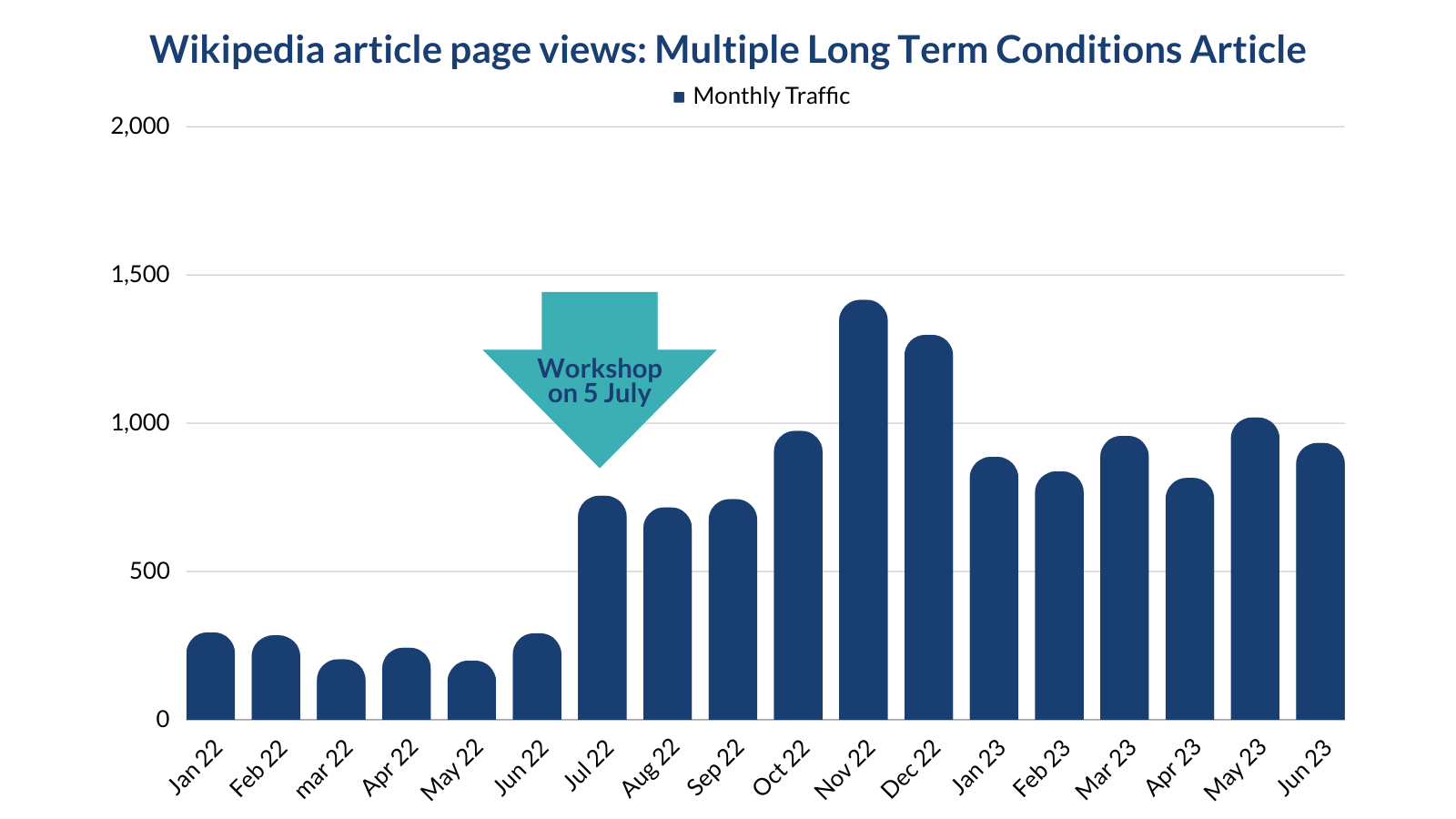Adam Harangozo, the National Institute of Health Research’s Wikipedian in Residence, explains how Wikipedia can be a highly effective dissemination tool, helping to make research findings widely accessible. He encourages researchers and public contributors at NIHR to make greater use of it and highlights the project’s future direction.
Since 2022, the NIHR has been piloting the use of Wikipedia as an innovative platform to share research results. In just over a year, working with researchers, patient and public contributors and NIHR staff, we have updated and expanded 400 Wikipedia articles with findings from NIHR-funded research.
The updated Wikipedia content now includes up to 300 citations to NIHR Evidence, and 200 citations to NIHR journals, plus other references to NIHR-funded studies. Following our edits, these articles have garnered an impressive 75 million views.
The Wikipedia project is now gaining momentum across the NIHR. What started as a pilot will turn into a permanent strand of our dissemination strategy. We expect this to lead to increased evidence uptake in policy and practice, and help to make knowledge more open.
Table: Some of the articles we have edited on Wikipedia and the number of times they have been viewed since our additions
| Wikipedia article | Words added | References added | Views |
|---|---|---|---|
| Multimorbidity | 6005 | 57 | 12897 |
| Dementia | 1075 | 9 | 1299115 |
| End-of-life- care | 1492 | 12 | 77391 |
| Anxiety disorder | 774 | 11 | 565970 |
| Management of obesity | 1094 | 10 | 21643 |
| Polypharmacy | 1182 | 10 | 49633 |
| Cancer screening | 1455 | 10 | 26813 |
| Doxycycline | 269< | 2 | 1466382 |
| Plantar fascitis | 252 | 1 | 1285654 |
Why should researchers use Wikipedia?
Wikipedia is an online encyclopaedia that is free to use and simple to edit. Contrary to popular belief, its editing policies and army of editors ensure that it is a reliable source of health information. It is also one of the most visited health resources on the internet. In 2019, Wikipedia’s medical content had more than 2 billion page views.
Referencing NIHR research on Wikipedia makes our research more accessible. It reaches a wide audience that includes laypeople and healthcare professionals alike. Studies have suggested that 50 – 70% of doctors consult Wikipedia for healthcare information. It was also found to be one of the most used resources by medical students.
Concerns and preconceptions about the reliability of Wikipedia need to be acknowledged. Yet, in my time at the NIHR, I’ve seen these worries fade away when I explain how Wikipedia works, and its checks and balances for accuracy. Most people are pleasantly surprised at how important Wikipedia is for health information, and how user-friendly it is.
Collaborative Wikipedia editing workshops
There is an appetite for harnessing Wikipedia’s potential. Several NIHR research teams and centres are now interested in integrating Wikipedia editing into their dissemination strategy. Some include it as part of their funding application.
Our thematic editing workshops for researchers, patients and members of the public have been impactful.
Other than access to the internet, there are no technical requirements. Prior knowledge of Wikipedia editing is unnecessary. Technical aspects are taken care of by the Wikipedian so participants can focus on enriching content.
During these workshops, 10-20 participants collaborate and aim to improve the quality of a single Wikipedia page corresponding to their research area.
For example, multiple long-term conditions are an area of strategic focus for the NIHR. But the Wikipedia page on multiple long-term conditions was short and outdated. It lacked evidence from the past 10 years. Following a workshop, the article now includes detailed evidence from NIHR-funded studies. It describes how terminology has changed, the impact of multiple long-term conditions on quality of life, and other updates.
In another workshop, we collaborated with the NIHR’s Mental Health Policy Research Unit. Together, we updated the article on the remote delivery of psychiatric care, known also as telepsychiatry. This expanded article now reflects their research on the practice and impact of telepsychiatry during the COVID-19 pandemic.
Graph: Improved content draws in more readers: Increased monthly traffic of the Multiple Long Term Conditions article following our workshop

Exploring new horizons
We have built a strong foundation for Wikipedia editing at the NIHR, with new opportunities for researchers to share and refine information on vital research. Many more topics could be covered in editing workshops, and previously edited articles can be updated as new evidence is published.
Social care, patient and public involvement, health equity, and global health are areas with untapped potential for Wikipedia editing.
We have started to deliver global health Wikipedia workshops, which will help share global health research with a lay audience, reaching additional people, potentially local audiences too as articles could be translated into other languages as well.
We are exploring how to nurture the next generation of health and care professionals and researchers. We are talking to health librarians and university departments, and suggesting that Wikipedia editing could be an assignment for medical students.
Discover more about the Wikipedia project
Wikipedia offers plenty of opportunities to share research widely. We can bring together a diverse community of researchers and patients to work on sharing health and care knowledge effectively. This will help ensure that more people can access the NIHR’s research, and perhaps also transcend language barriers.
As Wikipedian-in-residence, I’m looking forward to new developments in knowledge sharing, and continued growth in access to information.
To learn more about the NIHR Wikipedia project, contact Adam Harangozo.






